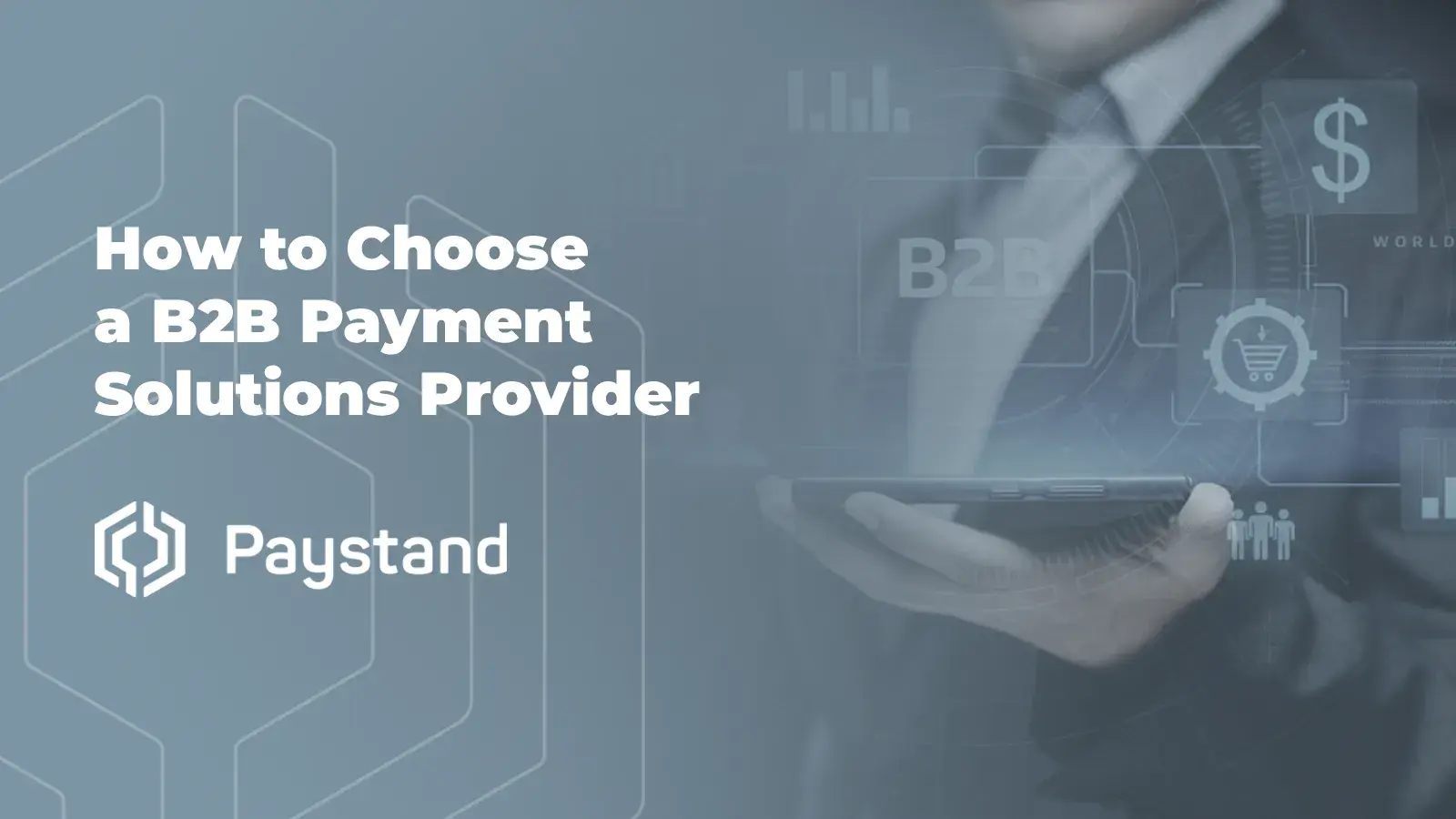How to Choose a B2B Payment Solutions Provider

There’s no question that today’s enterprise companies find themselves on a constant search for both the processes and technologies needed to automate their accounting systems, and, in many cases, the legacy payment infrastructure serves as a significant barrier to achieving this when it comes to being as cost-effective as possible. However, even as new payment solutions enter the market, it’s essential for executives to understand how they compare with one another and against the conventional payment systems that exist today – especially when many offerings aren’t designed to support B2B transactions.
This guide will outline some of the key challenges that midsize and enterprise companies face when navigating the payments landscape.
Manual processes are still common
Although the movement to digital payments has become much more popular in recent years in the B2C space with consumers transitioning from cash and paper checks to credit cards, electronic funds transfer, and digital payment systems, the same cannot be said for midsize and enterprise organizations.
According to Fortune Business Insights, the global market for accounting software is expected to grow at a CAGR of 8% between 2018 to 2026, an increase from $11 billion to $20 billion, illustrating that companies are still looking for technology-driven solutions to reduce costs and increase revenue.
At the same time, midsize and enterprise companies often rely on paper checks because, in the past, they provided a definite audit trail, offered security and fraud protection, and came with traceability. Even 10 years ago, newer methods of digital payments didn’t offer some of these advantages, or if they did, they lacked a proven track record to garner corporate confidence. (A lot has changed in the last 10 years…)
In addition, most B2B transactions revolve around a longer-term vendor relationship where purchasing and invoicing happen against a negotiated contract. In the past, checks were often preferred in these high-volume environments.
Unfortunately, the manual processes involved in collecting and posting payments into a legacy system are time-consuming and error-prone. Cash flow issues, labor costs to process and reconcile paper checks, and collection problems add to a company’s overall costs.
Credit card fees are a significant liability
Companies that accept credit card payments for B2B transactions often assume that high fees are simply a cost of doing business. Up until recently, that may have been the case. Thankfully, there are B2B payments solution providers who now offer options to bypass those fees.
Considering that credit card companies charge roughly 3% per transaction, that can translate to an annual cost of $60,000 on $2 million in revenue. Depending on a company’s revenue, that recurring and growing cost may warrant a serious look at B2B digital payment solutions.
The payment landscape
Many B2B payment solution providers can help companies overcome current challenges that exist with both paper check and credit card payments. They can offer the speed of credit cards, the security of paper checks, and the additional benefits of reduced costs and ERP data integration in some cases. Here are the top payment solution providers in the payments landscape, including options for B2C and B2B payments.
Stripe: an API for small and midsize businesses
Stripe was established in 2009 and has become one of the most popular payment solution providers today; however, Stripe caters to small and midsize businesses that rely on lower-ticket, lower complexity payments. The company has a broad scope, attempting to bring everything together for running a small business – from building websites to apps that accept and send payments.
Stripes offers an open API, which allows clients to customize its platform in order to eliminate bottlenecks and streamline the payment processes. Over the years, Stripe has added tools to manage fraud, build marketplaces, and offer multiple payment options. Although companies do not pay sign-up fees, transaction costs include both a percentage of the amount collected as well as a flat fee.
Advantages:
- Simple user interface, which makes installation, management, and updates easy
- Single page structure, which means customers never have to click away
- Customizable, which gives clients flexibility in the payment experience
Disadvantages:
- IT support needed, which requires an employee to utilize the open API
- Communications issues, which lead to confusion about account holds and cancellations
- Credit card issues, which include no verification, limited merchant support, and individual transaction fees
- Small business-focused, which means midsize and enterprise companies can’t access the benefits
Bill.com: an AP solution for small and midsize businesses
Established in 2006, Bill.com’s founders wanted to make paper-based manual transaction processing obsolete by transforming how customers manage cash inflows and outflows, creating efficiencies, and reducing AP-related resources.
Bill.com offers an integrated platform that is powered by machine learning to streamline data entry and reduce human errors. Based in the cloud, this B2B payment solution provider helps customers accept new ways to pay including bank transfers, virtual credit cards, and international wire transfers.
Advantages:
- Expand accounting capabilities, which allows ACH transfers for both
- Easy integration, which allows data to be shared on enterprise platforms
- Customizable, which gives clients flexibility in the payment experience
Disadvantages:
- Limited vendor control, which means customers need to update information
- Interface updates are poor, which leads to confusion and user frustration
Tipalti: an AP Solution for midsize and enterprise companies
Founded in 2010, Tipalti automates a business’s payment management process, promising to reduce accounts payable workload by 80%. The B2B payment solution can be integrated into popular ERP systems through the automation of importing and exporting tasks.
Tipalti offers the ability to meet IRS tax requirements easily and screens customers before transactions are processed. By accepting six payment methods and multiple currencies, the company provides customers with the flexibility to collect globally. Tipalti also has advanced payment configurations including thresholds and sharing fees.
A subscription-based pricing model can be customized depending on the capabilities required and budget.
Advantages:
- International compliance, which is possible through a special supplier portal
- Normalized data, which reaches across multiple payment options through automation
Disadvantages:
- Limited search capabilities, which can make it difficult to find payees
- Paypal integration, which is not accepted globally
- Slow dashboard, which occurs during high traffic periods
Square: hardware and point of sale for small businesses
Square began in 2009 as a payment provider to process business transactions easily and securely with no long-term commitment or fees. Square also provides hardware to collect credit cards, and clients can collect payments that are entered through tapping, swiping, manual entry, invoices, or online payments. An open API allows customization as well.
Although the app is offered at no charge, each transaction carries a percentage of the transaction fee plus a flat rate.
Advantages:
- No subscription fees, which means costs are associated only with transactions
- Extensive reporting, which provides data for analysis
Disadvantages:
- Costs rising, which includes continually growing transaction fees and instant deposit costs
- Multiple locations challenge, which causes difficulty with switching between accounts
Paysera: a payment gateway for e-shops and small businesses
Started in 2004, Paysera is a payment solutions provider that is popular internationally. Working within a Paysera network, the provider offers relatively inexpensive, fast payment transfers in more than 180 countries. Although global transfers have a minimum of $30, most payment transactions are inexpensive and fees will only vary depending on the currency and speed required.
Advantages:
- Fast delivery of payments, when compared with other international payment options
- Inexpensive fees, which are minimal or non-existent
Disadvantages:
- Limited options, which are focused on Paysera accounts
- Geographical limits, which are only in Europe
Paystand: AR-focused for midsize and enterprise companies
Founded in 2013, Paystand’s mission is to reinvent commercial finance. It is the only payment provider with a flat-fee, subscription model that eliminates transaction fees altogether. Customers can easily white-label or brand their own payment portal to maintain end-to-end branding throughout the payment process. Using automated workflows, clients can send invoices to their customers with a clear, embedded “pay now” button, which takes customers into the individual company’s private portal where they can select a payment method.
As one of the leading B2B payment providers, Paystand encourages bank-to-bank transfers giving merchants the ability to either incentivize zero-fee payment rails or shift the credit card fee to the customer at this decision point; if the customer chooses to pay by credit card, a convenience fee is added to the transaction..
As a result, Paystand effectively bypasses credit card fees as well as mail delays and manual entry of paper check payments. In addition, because Paystand integrates tightly with a customer’s ERP system, deposits are made, posted, and reconciled without manual intervention. The bottom line is that clients receive payments faster while eliminating transaction fees and manual processes.
Advantages:
- Flexible payment options, which can save up to 51% of processing costs
- Streamlined invoicing and collections, which can reduce late payments by as much as 60%
- Accounts receivable automation, which can eliminate up to 70% of manual tasks
- Lower costs, which unlock revenue sources and boost margins
- Customizable payments, which give clients flexibility in the payment experience
- Tiered pricing, which eliminates any per-transaction costs
Final Thoughts
As companies review existing payment solutions, they will inevitably need to prioritize features and advantages that are most important to them. The focus in general will be on reducing credit card transaction fees, eliminating human error, streamlining payment processes, and seamless integration into a company’s ERP systems.
For midsize and enterprise companies, it’s essential to pick a solution that reduces operating costs, automates critical AR tasks, and eliminates transaction fees for good. If you’re looking for all of the above, click here to meet with one of Paystand’s payment experts today.






